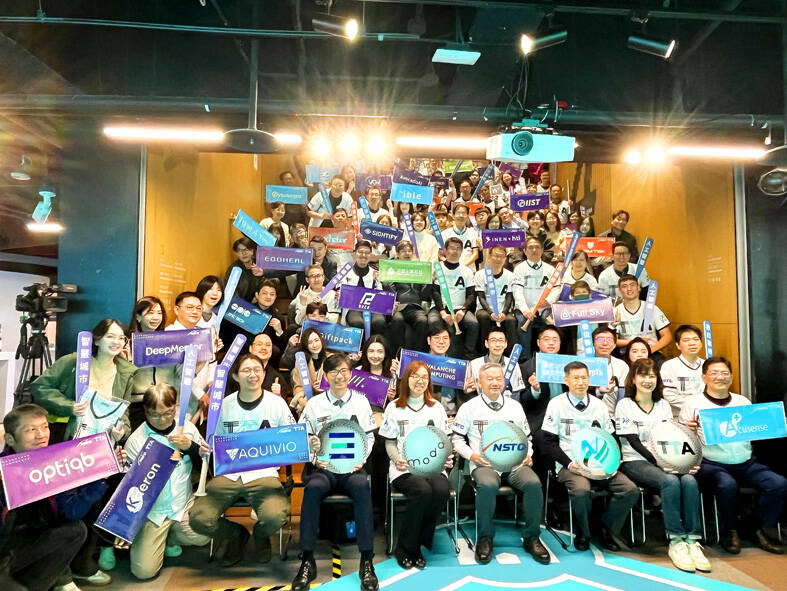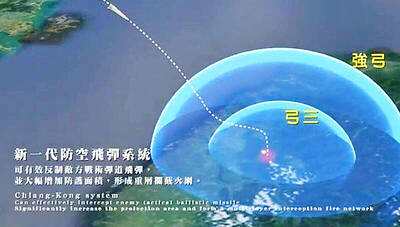Seventy-two inventions have been selected to showcase the nation’s technological innovation at next year’s CES — formerly an initialism for the Consumer Electronics Show — the National Science and Technology Council (NSTC) said yesterday.
The CES is to take place in Las Vegas from Jan. 7 to 10.
Those selected were mainly related to artificial intelligence (AI), digital medicine, smart city, sustainability and vehicle technology, NSTC Minister Wu Cheng-wen (吳誠文) said.

Photo: Hsu Tze-lin, Taipei Times
Smart city technology, AI and digital medicine accounted for 37 percent, 25 percent and 24 percent of the chosen entries respectively, he added.
Taiwanese inventors’ participation in CES 2025 is a boon for the nation’s efforts to build international markets, supply chains and sovereign AI technology, Wu said, adding that the event helps connect innovators with investors.
The council’s vision is for the nation to use innovative technology in the service industry to supplement the high-tech manufacturing sector’s contributions to the economy, he said.
On Jan. 3, officials are to unveil a project to facilitate development and manufacture of general utility technology that can be applied across the economy, Wu said.
The National Laboratory Animal Center, FaceHeart Corp and R2C2 Limited clinched a CES innovation award, the NSTC said in a statement.
The National Laboratory Animal Center’s invention — an integrated system to simulate blood clot formation to replace animal testing — was also its first, it said, adding that the platform can model clotting and pharmaceutical effects in multiple species.
FaceHeart’s creation was an AI-based imagery system that can derive a 90 percent accurate measurement of a person’s cardiovascular health index from a 45-second scan, the NSTC said.
The R2C2 Arc system is a mobile platform that can manage industrial robot fleets, featuring large language model AI and block-chain enabled information security measures, it said.
Ministry of Digital Affairs Chief Secretary Betty Hu (胡貝蒂) said the ministry has obtained a NT$10 billion (US$305.89 million) budget from the council to fund Taiwanese AI and other digital technology developers whose products are not monetized yet.
The selected inventors are welcome to apply for government funding, as they are presumed to be eligible under the ministry’s guidelines, she said.
Additional reporting by CNA

LIMITS: While China increases military pressure on Taiwan and expands its use of cognitive warfare, it is unwilling to target tech supply chains, the report said US and Taiwan military officials have warned that the Chinese People’s Liberation Army (PLA) could implement a blockade within “a matter of hours” and need only “minimal conversion time” prior to an attack on Taiwan, a report released on Tuesday by the US Senate’s China Economic and Security Review Commission said. “While there is no indication that China is planning an imminent attack, the United States and its allies and partners can no longer assume that a Taiwan contingency is a distant possibility for which they would have ample time to prepare,” it said. The commission made the comments in its annual

DETERMINATION: Beijing’s actions toward Tokyo have drawn international attention, but would likely bolster regional coordination and defense networks, the report said Japanese Prime Minister Sanae Takaichi’s administration is likely to prioritize security reforms and deterrence in the face of recent “hybrid” threats from China, the National Security Bureau (NSB) said. The bureau made the assessment in a written report to the Legislative Yuan ahead of an oral report and questions-and-answers session at the legislature’s Foreign Affairs and National Defense Committee tomorrow. The key points of Japan’s security reforms would be to reinforce security cooperation with the US, including enhancing defense deployment in the first island chain, pushing forward the integrated command and operations of the Japan Self-Defense Forces and US Forces Japan, as

IN THE NATIONAL INTEREST: Deputy Minister of Foreign Affairs Francois Wu said the strengthening of military facilities would help to maintain security in the Taiwan Strait Japanese Minister of Defense Shinjiro Koizumi, visiting a military base close to Taiwan, said plans to deploy missiles to the post would move forward as tensions smolder between Tokyo and Beijing. “The deployment can help lower the chance of an armed attack on our country,” Koizumi told reporters on Sunday as he wrapped up his first trip to the base on the southern Japanese island of Yonaguni. “The view that it will heighten regional tensions is not accurate.” Former Japanese minister of defense Gen Nakatani in January said that Tokyo wanted to base Type 03 Chu-SAM missiles on Yonaguni, but little progress

INTERCEPTION: The 30km test ceiling shows that the CSIST is capable of producing missiles that could stop inbound missiles as they re-enter the atmosphere Recent missile tests by the Chungshan Institute of Science and Technology (CSIST) show that Taiwan’s missiles are capable of intercepting ballistic missiles as they re-enter the atmosphere and pose a significant deterrent to Chinese missile threats, former Hsiung Feng III missile development project chief engineer Chang Cheng (張誠) said yesterday. The military-affiliated institute has been conducting missile tests, believed to be related to Project Chiang Kung (強弓) at Pingtung County’s Jiupeng Military Base, with many tests deviating from past practices of setting restriction zones at “unlimited” and instead clearly stating a 30.48km range, Chang said. “Unlimited” restrictions zones for missile tests is